| Listing 1 - 10 of 28 | << page >> |
Sort by
|
Book
Year: 1934 Publisher: Kopenhagen : Nörrebros Centraldruckerei,
Abstract | Keywords | Export | Availability | Bookmark
 Loading...
Loading...Choose an application
- Reference Manager
- EndNote
- RefWorks (Direct export to RefWorks)

ISBN: 0813514622 Year: 1991 Publisher: New Brunswick, NJ : Rutgers University Press,
Abstract | Keywords | Export | Availability | Bookmark
 Loading...
Loading...Choose an application
- Reference Manager
- EndNote
- RefWorks (Direct export to RefWorks)
Book
ISBN: 0451626176 Year: 1972 Publisher: New York, NY : Mentor Books,
Abstract | Keywords | Export | Availability | Bookmark
 Loading...
Loading...Choose an application
- Reference Manager
- EndNote
- RefWorks (Direct export to RefWorks)
LITTERATURE AFRO-AMERICAINE --- AFRO-AMERICANS --- LITERATURE --- BLACK AUTHORS
Audio
Year: 1996 Publisher: London ; New York, NY : W.W Norton,
Abstract | Keywords | Export | Availability | Bookmark
 Loading...
Loading...Choose an application
- Reference Manager
- EndNote
- RefWorks (Direct export to RefWorks)
LITTERATURE AMERICAINE --- LITTERATURE AFRO-AMERICAINE --- AUTEURS NOIRS --- ANTHOLOGIES
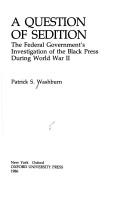
ISBN: 019503984X Year: 1986 Publisher: New York Oxford Oxford University Press
Abstract | Keywords | Export | Availability | Bookmark
 Loading...
Loading...Choose an application
- Reference Manager
- EndNote
- RefWorks (Direct export to RefWorks)
African American press --- Afro-Amerikaanse pers --- Presse afro-américaine --- World War, 1939-1945 --- Censorship --- United States
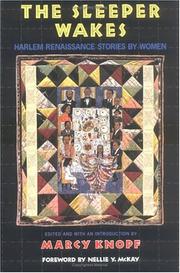
ISBN: 0813519454 Year: 1993 Publisher: New Brunswick, NJ : Rutgers University Press,
Abstract | Keywords | Export | Availability | Bookmark
 Loading...
Loading...Choose an application
- Reference Manager
- EndNote
- RefWorks (Direct export to RefWorks)
BLACK --- AFRO-AMERICANS --- LITTERATURE AFRO-AMERICAINE --- LITERATURE --- BLACK LITERATURE --- HARLEM RENAISSANCE --- U.S.
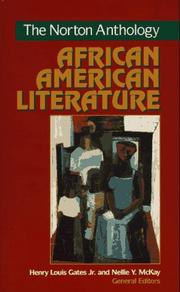
ISBN: 0393959082 0393040011 Year: 1997 Publisher: New York (N.Y.) : Norton,
Abstract | Keywords | Export | Availability | Bookmark
 Loading...
Loading...Choose an application
- Reference Manager
- EndNote
- RefWorks (Direct export to RefWorks)
American literature --- Thematology --- anno 1800-1999 --- #KVHA:Bloemlezingen; Afro-Amerikaanse literatuur --- African American authors --- African Americans --- Literary collections --- LITTERATURE AFRO-AMERICAINE --- LITTERATURE AMERICAINE --- ANTHOLOGIES --- AUTEURS NOIRS
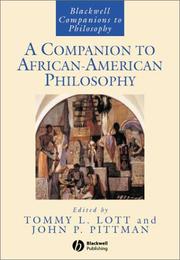
ISBN: 1557868395 1405145684 9781405145688 0585488207 0470751649 178268414X 1280285532 1405164395 9786610285532 1282349619 9786612349614 0470751630 Year: 2006 Volume: 25 Publisher: Malden ; Oxford Blackwell Publishing
Abstract | Keywords | Export | Availability | Bookmark
 Loading...
Loading...Choose an application
- Reference Manager
- EndNote
- RefWorks (Direct export to RefWorks)
African American philosophy --- Afro-Amerikaanse filosofie --- Philosophie afro-américaine --- African American philosophy. --- Primary groups --- Philosophy --- #GGSB: Filosofie --- Afro-American philosophy --- Philosophy, African American --- Philosophy, American --- Filosofie
Book
ISBN: 9780813927398 9780813927404 Year: 2008 Publisher: Charlottesville, Va University of Virginia Press
Abstract | Keywords | Export | Availability | Bookmark
 Loading...
Loading...Choose an application
- Reference Manager
- EndNote
- RefWorks (Direct export to RefWorks)
Through its critical examination of novels by Toni Morrison, Charles Johnson, Sherley Anne Williams, Octavia Butler, John Edgar Wideman, Phyllis Perry, Ishmael Reed, Caryl Phillips, and others, The Diasporan Self presents a fresh and insightful approach to canonical and noncanonical contemporary fictional slave narratives. Through his careful study of the discourse of this subgenre, J. Lee Greene formulates a significant new approach to the interpretation of contemporary African American literature. Drawing directly from the authors' novels, essays, and interviews, Greene extracts, synthesizes, and narrativizes a foundational myth that the novelists collectively generate. This diasporan myth and its accompanying theory of Western black Being are grounded in the historical black African diaspora. Together they seek to explain the history and nature of Western blacks, and thus give rise to key aspects of form and meaning in the texts Greene discusses. The Diasporan Self convincingly establishes the self-theorizing nature of these postmodern novels, constructing from them a critical vocabulary germane to their production and interpretation. Greene explores the strong influence of Jean Toomer's fictional and philosophical writings on these contemporary authors as well as the authors' incorporation of religious philosophy and cultural anthropology from several Western and non-Western cultures. The critical paradigm Greene formulates is applicable not only to contemporary fictional slave narratives and other diasporan novels but also to other Western black art forms.
Sociology of literature --- Fiction --- Thematology --- American literature --- LITTERATURE AMERICAINE --- LITTERATURE AFRO-AMERICAINE --- Esclavage --- MOI --- IDENTITE DANS LA LITTERATURE --- AUTEURS NOIRS --- Dans la littérature --- DANS LA LITTERATURE
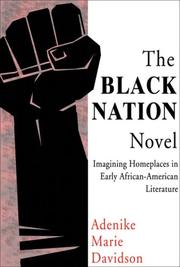
ISBN: 9780883782811 0883782812 Year: 2008 Publisher: Chicago : Third World Press,
Abstract | Keywords | Export | Availability | Bookmark
 Loading...
Loading...Choose an application
- Reference Manager
- EndNote
- RefWorks (Direct export to RefWorks)
Examining early African American literature from the perspective of a Black Nationalist literary critic, this analysis explores important novels from the 19th and 20th centuries. The discussion demonstrates that Black Nationalist themes were present in many early novels, prefiguring the themes that would become the centerpiece of the Black Power Movement. One of the few books that examines early African American novels, this definitive exploration of them adds to the discussion of black literature and literary criticism.
NATIONALISME NOIR --- NOIRS AMERICAINS DANS LA LITTERATURE --- LITTERATURE AFRO-AMERICAINE --- POLITIQUE ET LITTERATURE --- DANS LITTERATURE --- HISTOIRE ET CRITIQUE --- ETATS-UNIS --- 19E SIECLE
| Listing 1 - 10 of 28 | << page >> |
Sort by
|

 Search
Search Feedback
Feedback About UniCat
About UniCat  Help
Help News
News